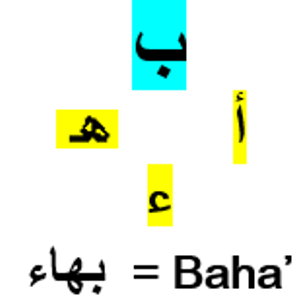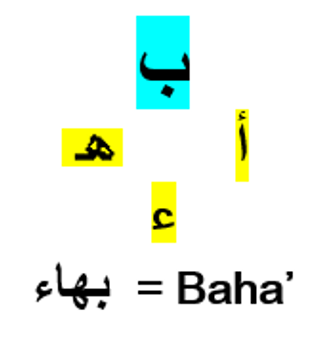
A Tetragram of Sacred Letters: On the Four Letters Composing the word Bahā’ and their sacred significances within Bābī-Bahā’ī sacred Writ.
Stephen Lambden, UC Merced 2018.
Preface –Abstract.
For Baha’is, the Arabic, Semitic word Bahā’ (see above) encapsulates the divine heights and sacred depths of their religion. It is the quintessence of the designation of the divine Person, Logos-Self (Ar. nafs) or Identity of Mirza Ḥusayn` Alī Nūrī who was given and assumed the title (Per.) Jināb-i Bahā’ (“His Eminence the Divine Splendour-Glory’”) and subsequently (Ar.) Baha’-Allah (= Bahā’u’llah, the `Splendour / Glory of God’). He was the founder of the Bahā’ī religion, and, for Bahā’īs, this title expresses the secret of the al-ism al-a`zam (The Greatest Name of God). Grammatically, the word Baha’ is a verbal noun (Ar. masdar) composed of three full Arabic letters and one additional quasi-letter. These letters are
- [1] the first letter B (ب),
- [2] the second letter H (ه),
- [3] the third letter A (أ ), followed by
- [4] the fourth element, which is the hamza (همزة = ء ), is not exactly one of the 28 letters of the Arabic alphabet, though one fundamental to certain of them as a glottal stop.
According to the Baha'i poet and historian Mullā Muhammad Nabil-i Zarandī (d.1892), Baha’u’llah was a key participant in the Babi conference of Badasht (in western Khurasan, Iran) held in the summer 1848 CE. At this religious congregation, he came to utilize and be known through the title Jināb-i Bahā’, meaning ‘His eminence the Divine Splendour’ (Dawn-Breakers, 211).
The word Baha’ does not occur in the Qur’an. It is not one of the 99 Names or Attributes which Muhammad - according to a famous tradition relayed from the first Imam amd fourth Caliph `Alī ibn Abi Talib (d. 40/661) or the companion of Muhammad `Abd al-Rahman ibn Sakhr al-Dawsi known as Abū Hurayra (`father of the little female cat'; d. c. 678) - were associated with God. The word Bahā’ is found about 18 times in the weighty, first major book of the Bāb, the Qayyūm al-asmā’ (The Self-Subsisting Locus of the Divine Names), as well as hundreds of times in his voluminous later Arabic and Persian writings communicated between 1844 and 1850 CE (=1260-1267 AH).
The most important of the ten or more major Names of the God of Israel is the (for traditionalist Jews) unpronounceable tetragrammaton (`fourfold Name = Heb. יהוה = YHWH). Jews never pronounce this unutterable, sublimely sacred Name. In late Jewish related Christian tradition, this sacred Name is associated with the Name ’Ādōnāy (= “Lord”), the vowel pointing of which enables its four letters to be (un) pronounced as “Jehovah”. According to modern biblical scholarship, this latter, essentially non-biblical Name, might be more accurately pronounced, Yahweh - though this latter possibility is uncertain. The important Name “Lord of Hosts” or YHWH ṣebā’ôt is viewed by Baha’is as a title of Baha’u’llah. In certain of his writings, Baha’u’llah associated the word Baha’ with the biblical divine Name YHWH, a name of God communicated to Moses on Sinai. On a mystical level, this was the cryptic, pre-existent Name Baha’.
In this paper, select numerological and theological comments upon the letters forming the Greatest Name’ - [1] B (ب), [2] H (ه), [3] A (أ ) and ء (hamza) - will be communicated in the light of the writings of the Bab, Baha’u’llah and `Abdu’l-Baha’, the central figures of the Baha’i religion.
✦

[1] The Letter B ب
[2] The Letter H (ه)
[3] The Letter A أ
[4] The Letter hamza (همزة = ء )
A Tetragram of Sacred Letters: On the Four Letters Composing the word Bahā’ and their sacred significances within Bābī-Bahā’ī writings.
Stephen Lambden, UC Merced 2018.
Based on a paper given at the `Irfan Colloqium in Santa Cruz, California in 2018.
Preface –Abstract: Another earlier draft.
For Baha’is, the Arabic, Semitic word Bahā’ (see above) encapsulates the divine heights and sacred depths of their religion. It is the quintessence of the designation of the divine Person, Logos-Self (Ar. nafs) or Identity of Mirza Ḥusayn` Alī Nūrī who was given and assumed the title (Per.) Jināb-i Bahā’ (“His Eminence the Divine Splendour-Glory’”) and subsequently (Ar.) Baha’-Allah (= Bahā’u’llah, the `Splendour / Glory of God’). He was the founder of the Bahā’ī religion. For his followers, the Bahā’īs, literally, “splendor generating persons” this title expresses the secret of the al-ism al-a`zam (The Greatest Name of God). Grammatically, the word Bahā’ is a verbal noun (Ar. maṣdar) composed of three full Arabic letters and one additional letter or quasi-letter, the glottal-stop hamza. These letters are [1] the first letter B (ب), [2] the second letter H (ه), [3] the third letter A (أ ), followed by the fourth element, which is the hamza (همزة = ء ), not one of the 28 letters of the Arabic alphabet, though one fundamental to certain of them as a glottal-stop.
According to the poet and historian Mullā Muhammad Nabil-i Zarandī (d.1892), Baha’u’llah was a key participant in the Babi conference of Badasht (in western Khurasan, Iran) held in the summer 1848 CE. At this religious congregation (if not earlier) , he came to utilize and be known through the title Jināb-i Bahā’, meaning ‘His eminence the Divine Splendour’ (Dawn-Breakers, 211).
The word Baha’ does not occur in the Qur’an. It is not one of the 99 Names or Attributes which Muhammad - according to a famous tradition relayed from Imam `Alī (d. 40/661) or Abū Hurayra (d.c.58/678) - were associated with God. The word Bahā’ is found about 18 times in the weighty first major book of the Bāb, the Qayyūm al-asmā’ (The Self-Subsisting Locus of the Divine Names), as well as hundreds or thousands of times in his voluminous later Arabic and Persian writings mostly communicated between 1844 and 1850 CE (=1260-1267 AH).
The most important of the ten or more major Names of the God of Israel is the (for traditionalist Jews) unpronounceable tetragrammaton (`fourfold Name = Heb. YHWH). Jews never pronounce this unutterable, sublimely sacred Name. In late Jewish related Christian tradition, this sacred Name is associated with the Name ’Ādōnāy (= “Lord”), the vowel pointing of which enables its four letters to be (un) pronounced as “Jehovah”. According to modern biblical scholarship, this latter, essentially non-biblical Name, might be more accurately pronounced, Yahweh - though this latter possibility is uncertain. The important Name “Lord of Hosts” or YHWH ṣebā’ôt is viewed by Baha’is as a title of Baha’u’llah. In certain of his writings, Baha’u’llah associated the word Baha’ with the biblical divine Name YHWH, a name of God communicated to Moses on Sinai. On a mystical level, this was the cryptic, pre-existent Name Baha’.
In this paper, select numerological and theological comments upon the letters forming the Greatest Name’ - [1] B (ب), [2] H (ه), [3] A (أ ) and ء (hamza) - will be communicated in the light of the writings of the Bab, Baha’u’llah and `Abdu’l-Baha’, the central figures of the Baha’i religion.
✦



